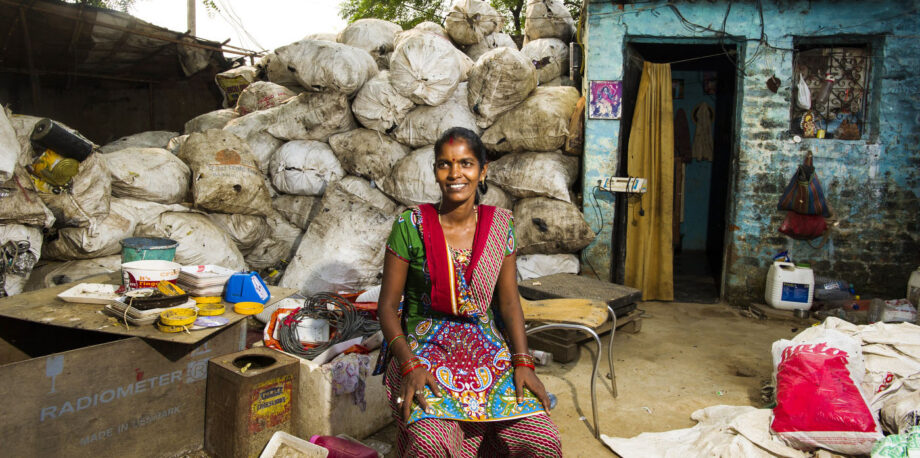November 14, 2013 — When night falls, two men go through the back entrance of a Pizza Hut in a swank neighborhood of South Delhi and load dozens of garbage bags on to their mini truck. Over the course of the night, they will visit five Pizza Hut restaurants, four KFCs, one hospital and the New Delhi railway station. The two men have never stepped inside the front door of a Pizza Hut or a KFC, but they’ve eaten the food from these outlets on days when money is tight and leftovers inside those garbage bags are plentiful. Nevertheless, they count themselves among the fortunate ones.
Once they’re done collecting the trash from their allotted spots, they bring it back to a small warehouse in the Mahipalpur neighborhood, where Rekha, their boss, takes it from them.
Rekha is not only their boss; she is wife to one and mother to the other. Rekha employs a team of people — 10 women and six men, including her husband and son — several of whom will sort through this trash during the day. The paper is separated into one pile, the cardboard boxes into another. Rekha tosses the leftover pizza dough into a large bucket, which she will sell later for 4 rupees a kilogram to her neighbors, who will then feed it to the cows. “When you give them this bread,” she explains in Hindi, pointing to the leftover dough, “the malnourished cows give more milk.” The plastic cups she sells for 8 rupees per kilogram. Bottles go for 15, and cartons for 5.
Wastepickers, mostly women, are an informal army of tens of thousands of workers who dig through Delhi’s garbage, gathering plastic, paper, pieces of metal, and shards of glass, recycling every scrap. …. They’re the single largest mitigator of greenhouse gas emissions in the city, more than any new technology.
Rekha arrived in Delhi 18 years ago with a six-month-old child strapped to her back. That six-month old is the young man who now does the nightly rounds with his father. He never went to school. Back then, Rekha worked in one of the city’s large landfills, living among the poorest citizens of the city and sorting through the mounds of trash for bits of paper and plastic that she might be able to sell.
Wastepickers, mostly women, are an informal army of tens of thousands of workers who dig through Delhi’s garbage, gathering plastic, paper, pieces of metal, and shards of glass, recycling every scrap. These workers have a tremendously positive impact on the environment. They’re the single largest mitigator of greenhouse gas emissions in the city, more than any new technology. Their savings are equivalent to removing roughly 175,000 passenger vehicles from the roads. Yet they can’t afford to educate their kids. They can’t get medical help for all the illnesses they pick up sorting through other people’s trash. They’re so poor, some days they can barely afford food.
But that picture is changing for some. Five years after she arrived, Rekha moved up the wastepicking ladder and out of the landfill. Instead of picking scraps, she started working in a posh neighborhood, collecting the trash directly from middle-class homes. Almost a decade later, she met representatives from Chintan Environmental Research and Action Group.
Because it reduces the amount of trash that is burned in air-polluting incinerators or added to overflowing landfills, this boost for wastepickers is a boost for the environment, too.Chintan is a nonprofit organization based in Delhi with the mission of improving the lives of wastepickers in the city. Last year, the organization was awarded the U.S. State Department’s first-ever Innovation Award for the Empowerment of Women and Girls — a $500,000 cash prize. As part of the promise to spend the money over two years, Chintan has launched several new programs that benefit wastepickers, including getting them work from corporates such as fast food chains, hotels and malls. “The idea is that we go out and get the work and then we train them and monitor quality. We do everything else and just ask them to handle the waste. When they do a good job, they get more and more work,” says Chintan’s director, Bharati Chaturvedi. Because it reduces the amount of trash that is burned in air-polluting incinerators or added to overflowing landfills, this boost for wastepickers is a boost for the environment, too.
Once Rekha connected with Chintan, she says, her life changed. Within months she had gone from being a door-to-door waste collector to being a waste entrepreneur. She was no longer sorting through garbage — she was managing the people who did. “As a wastepicker, you get no respect,” she says. “People shun us, tell us to go away and not touch their things because we’re dirty and work with their filth.” Over the past 18 years, she kept her work secret from her extended family. These days, she says, she walks into a room and the affiliation with Chintan automatically gets people to shake her hand.
Chaturvedi says that just a little effort on the part of corporations to contract with Chintan for wastepicking services rather than selling their trash to be recycled or incinerated can make a huge difference in the lives of wastepickers like Rekha. The railway station, for instance, has created nearly 200 jobs, the Taj Group of Hotels —another early adopter — about 50, and a mall in South Delhi that has handed over its waste collection to Chintan has created almost 40 jobs for wastepickers. The Indian government recently passed a law requiring companies making a profit over a certain threshold to invest 2 percent of their profits in corporate social responsibility projects, so firms that work with Chintan benefit by counting the value of the waste in that total rather than selling it.
“They saw that I had respect, that I was a businesswoman.” — RekhaChaturvedi thinks that American corporations with subsidiaries or ties in India could support wastepicking organizations such as Chintan as a way to help push environmentally friendly practices that also change the lives of the people who handle their trash. “I think what they could do is stop taking money for their waste. They should understand that their waste is a currency that kills poverty.”
Last month, relatives from Rekha’s village came to visit and her secret life working with garbage came out in the open. But Rekha was prepared. She had an identity card, an office address and contacts at Chintan who she could call at any time. The relatives were impressed. “They saw that I had respect, that I was a businesswoman,” says Rekha. “The rest of it no longer mattered.” ![]()
Ensia shares solutions-focused stories free of charge through our online magazine and partner media. That means audiences around the world have ready access to stories that can — and do — help them shape a better future. If you value our work, please show your support today.
Yes, I'll support Ensia!
